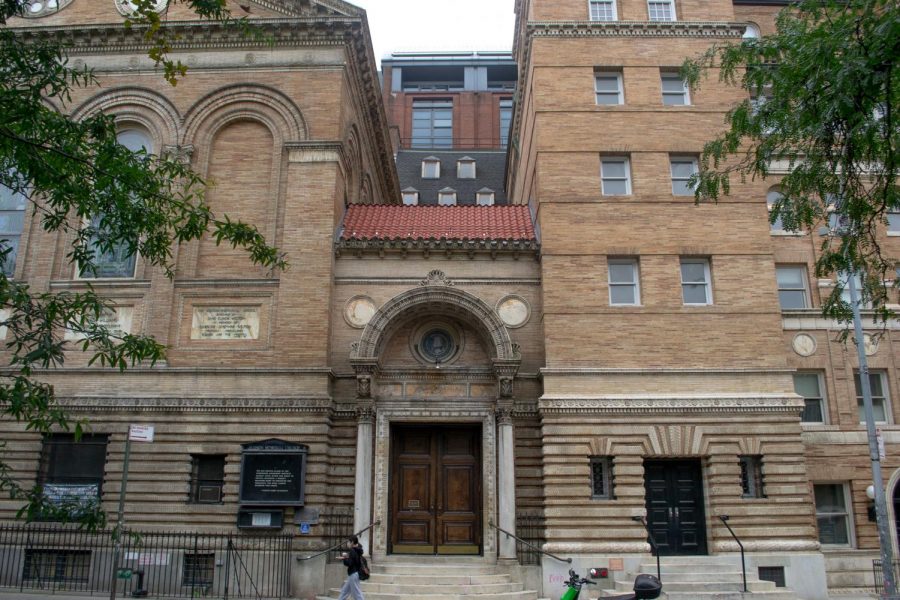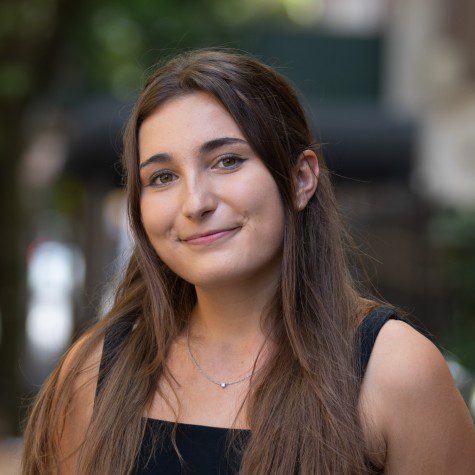NYU employees launch free farmstand to combat food insecurity on campus
The Minetta Creek Collective’s farmstand, set to launch on Oct. 6, reimagines the concept of a food bank for the NYU and Greenwich Village communities.
NYU employees have launched a farmstand free of charge near campus at Judson Memorial Church. Research shows that 50% of college students are affected by food insecurity. (Photo by Camille Harvell)
October 6, 2021
Three NYU administrators have established an organization aiming to combat food insecurity on and around NYU’s Washington Square campus. The Minetta Creek Collective will operate its first free farmstand from 1 to 5 p.m. on Oct. 6 at the Judson Memorial Church near Washington Square Park. It will return weekly on Wednesday afternoons.
The collective is co-founded by Maura Puscheck, a program administrator for a Steinhardt communications program, Chelsea Rhodes, a CAS graduate history program administrator, and Gallatin professor David Sugarman. Puscheck, Rhodes and Sugarman want to provide fresh produce and other essential items to the NYU community and its neighbors by restructuring the traditional model of a food pantry into a streetside stand.
“We’re setting up tables much like the farmer’s market you’d see,” Rhodes said. “We have canned goods and dry goods, but we also have a lot of produce and we’re going to provide bags. People can come through and fill up their bags and take what they need.”
The Minetta Creek Collective’s goal is to provide an accessible and approachable resource for the community. Puscheck noted that since the stand is outdoors and close to Washington Square Park, it seamlessly blends into the neighborhood more than a traditional food pantry.
“We want something that’s a resource not just for those who might conceive of themselves as in need, but something that is organically part of our community that we can all use,” Puscheck said. “Making a different kind of experience for someone who might be looking for food, and giving the community a different idea of what this could look like, and how they might be able to access it and use it.”
The founders also hope that the initiative will help reduce the stigma surrounding food insecurity and create a space where people can speak about their experiences openly.
“We want to bring people what they need, but also make them feel like there’s dignity in that process,” Rhodes said. “For students who are struggling to take care of their many responsibilities — their coursework and their work schedules and their life balance — there can be stigma around needing this kind of help.”
Ellie Berube is an LS student and a student coordinator for the New York City-based College Student Pantry, another organization working to combat food insecurity on university campuses. The College Student Pantry is partnering with the Minetta Creek Collective to establish the Washington Square Park farmstand. Berube said that initiatives like the farmstand are needed to combat food insecurity, even at NYU.
“Research shows that around 50% of U.S. college students are food insecure, and that number only grew with the pandemic,” Berube said. “There is the misconception that because NYU is so expensive, it means that everyone has money. Unfortunately — not the case.”
Two local churches, Judson Memorial and Trinity, are donating the vast majority of the food and supplies that will be distributed by the farmstand. Judson Memorial has also agreed to house the farmstand and provide administrative and storage space.
“What the Judson Food Bank has gathered from research and anecdotal evidence is that 41% of NYU students are food insecure,” Nekeisha Lewis, program director of the Judson Food Bank, said. “Almost half of a college’s student population going hungry is indicative of both a lack of awareness and inaction on the part of our leaders at the campus, city, state and federal levels.”
Shamon Lawrence, who serves as the senator at-large for students experiencing food insecurity and basic needs insecurity on NYU’s student government, said that he is looking forward to building a relationship with the collective.
“The new farmstand will profoundly impact the NYU community since many students and faculty live in food deserts and experience food insecurity,” Lawrence said. “The Minetta Creek Collective was proactive in prioritizing the farmstand to grant food-insecure people the autonomy to access food.”
The Minetta Creek Collective was created in response to an increase in media coverage of food insecurity and its impact on university students in New York City. Rhodes said that the awareness provoked an inability to look away and compelled her and her colleagues in the history department at CAS to confront the issue.
“We brainstormed for a while and decided that something we could do at the department level was just put food out for our students,” she said. “No questions asked, just leave it by the elevators. That’s where we started.”
Though the collective has grown and evolved since then, Puscheck said that she recognizes that the farmstand is not a catchall solution.
“We see needs in this community that we can’t address on our own,” she said. “We’ve adopted this ear-to-earth stance where we want to listen, we want to talk to people and then be responsive to that and do what we can.”
In addition to the farmstand and other planned programming, the collective’s founders have brainstormed ideas for the future, such as a free mobile library and a traveling version of the farmstand that would move throughout the area while the original farmstand is in operation.
Currently, however, all efforts are focused on spreading awareness about Wednesday’s farmstand launch.
“We’re just excited, and hopefully people will hear about it in time,” Rhodes said. “We want everyone to feel welcome to take what they need. It’s a resource for you, so come visit us.”
Further information about the Minetta Creek Collective and opportunities to volunteer can be found at the organization’s website and on social media.
Correction, Oct. 6: A previous version of this article neglected to mention David Sugarman as a co-founder of the Minetta Creek Collective. The article has been updated to reflect the correction and WSN regrets the error.
Contact Abby Wilson at [email protected].

























































































































































